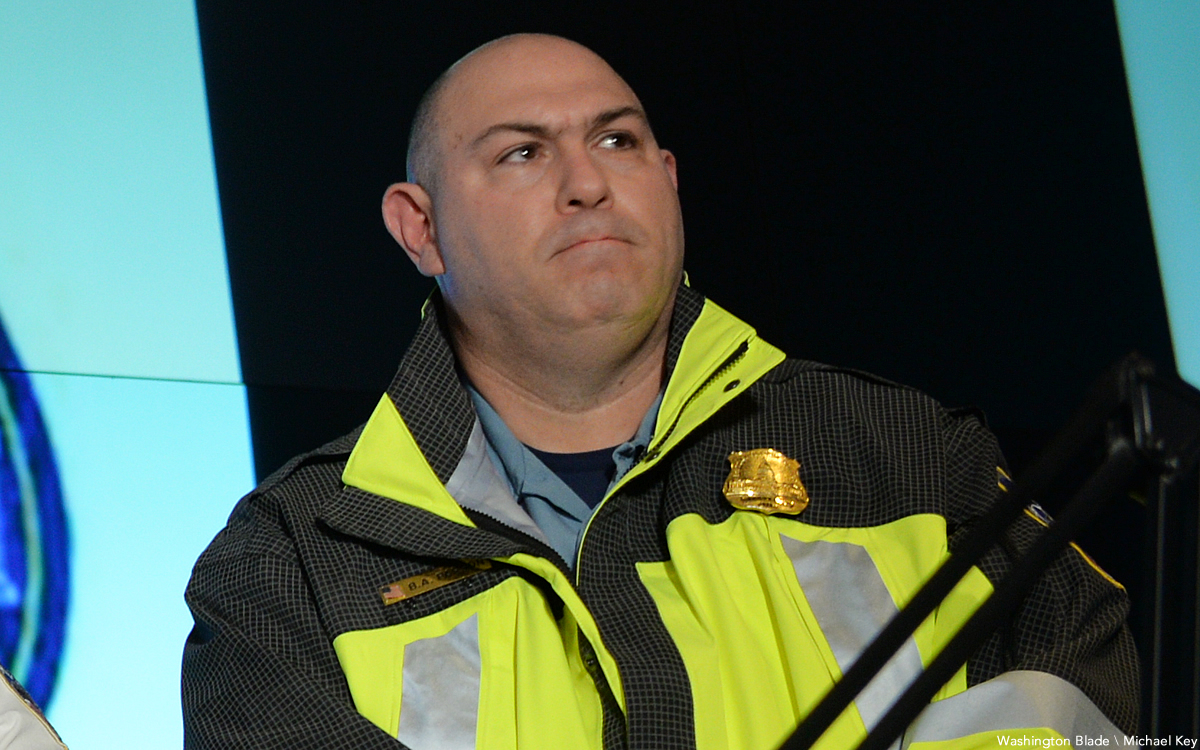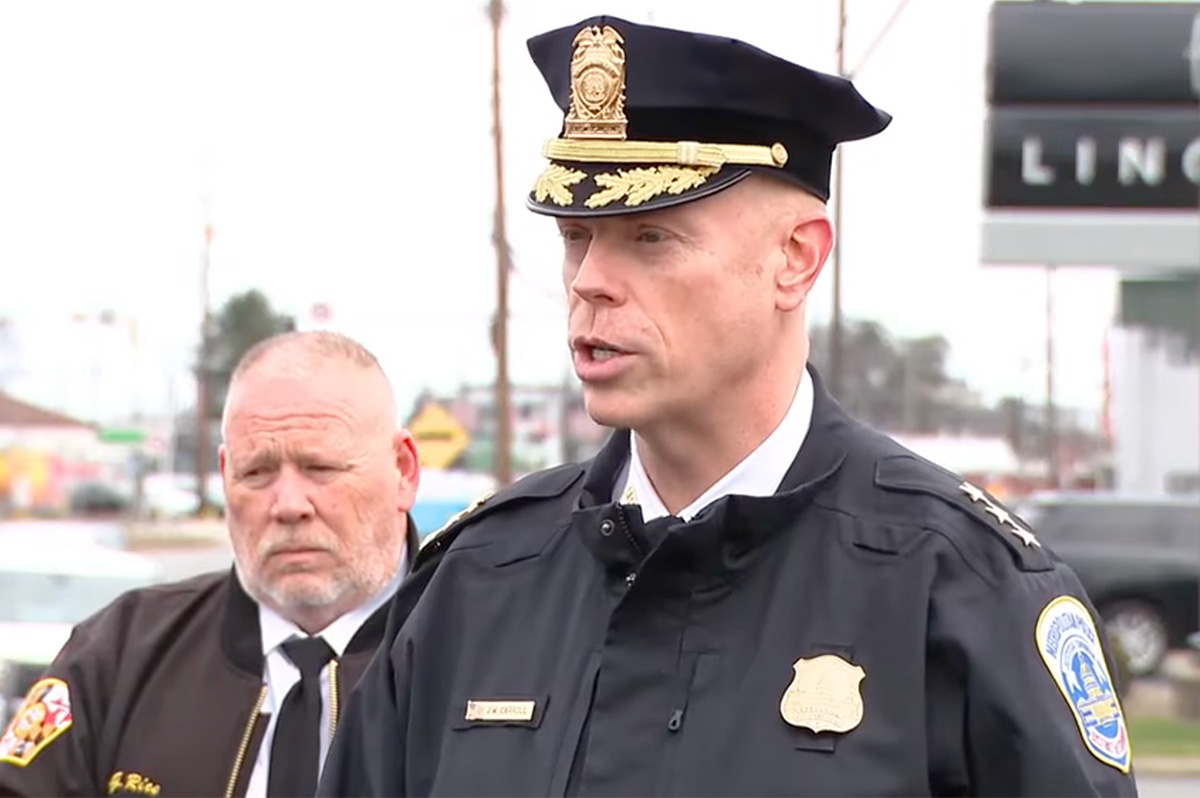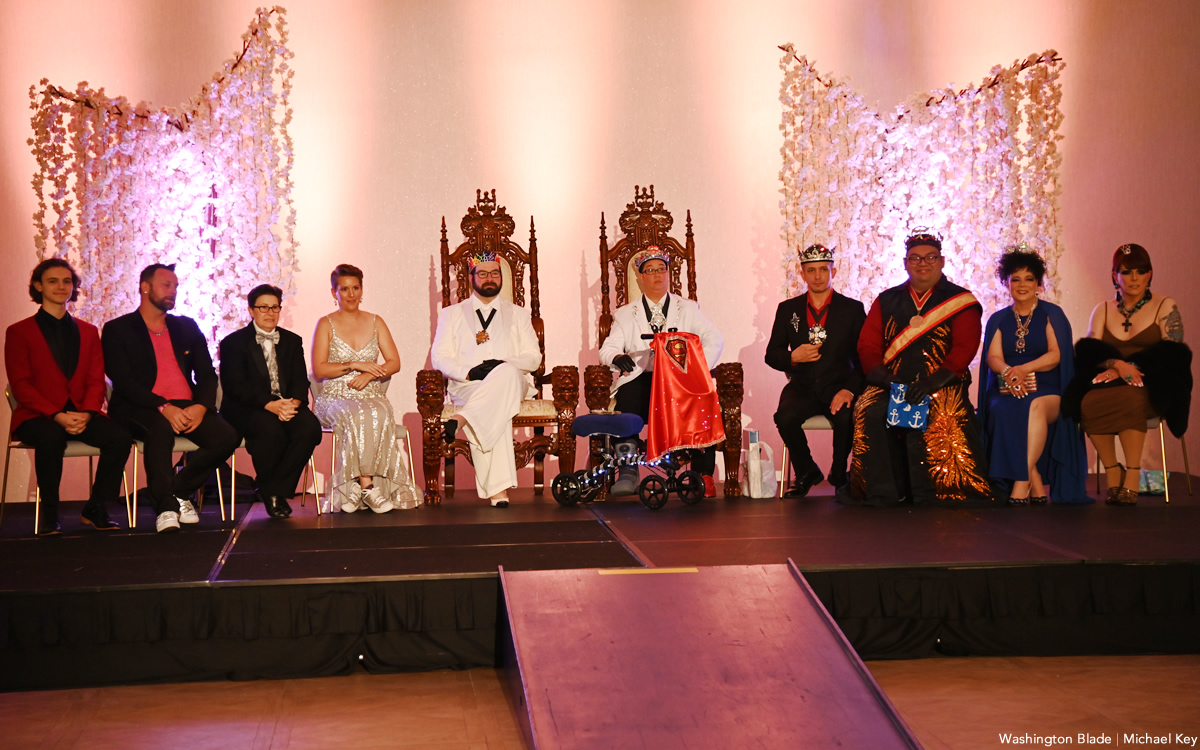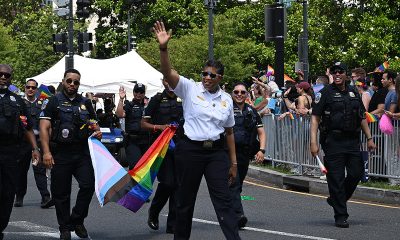District of Columbia
Florida prosecutor expected to drop sex with minor charges against Brett Parson
Former D.C. cop arrested in 2022 for alleged consenting sex with 16-year-old

A spokesperson for the lead prosecutor in Broward County, Fla., has confirmed a notice filed in court indicating plans for dropping two counts of unlawful sexual activity with a minor filed against former D.C. police lieutenant Brett Parson by Boca Raton, Fla., police in February 2022.
An arrest affidavit filed by Coconut Creek police at the time of Parson’s arrest on Feb. 18, 2022, says Parson allegedly had a consenting sexual encounter with a 16-year-old boy who told police he met Parson on the gay online dating app Growlr and agreed to meet for a sexual encounter after the two exchanged “explicit” photos of each other.
Police and prosecutors at the time charged Parson, 54, with violating Florida’s age of consent law, which is 18, even though authorities acknowledged that the Growlr app requires users to be at least 18 years old.
“There is a court hearing scheduled for 8:30 a.m. on Monday [March 13] when it is anticipated the prosecutor will drop or dismiss the two counts of unlawful sexual activity with a minor,” Paula McMahon, Public Information Officer for the Broward State Attorney’s Office, told the Washington Blade in a March 9 email message.
“If the hearing goes ahead as anticipated, the prosecutor will provide the judge with full details,” McMahon said. “These include the parents of the victim, who was 16 at the time of the incident, recently informed prosecutors that he does not want to go forward with the case.”
McMahon told the Blade in her message that her office would be in a position to release more information about the outcome of the case after the March 13 hearing in Broward County Circuit Court, which is located in Fort Lauderdale.
NBC 4 Washington was the first to report the plans by prosecutors to drop the charges against Parson.
Parson’s arrest took place about two years after he retired from the Metropolitan Police Department of D.C. after a 26-year career in which, among other duties, he served as supervisor of the department’s LGBT Liaison Unit. At the time of his retirement Parson announced he was starting a consulting business to advise law enforcement agencies in the U.S. and abroad on police-related issues.
Parson has declined to speak with the media since the time of his arrest.
Charging documents filed by Boca Raton and Coconut Creek, Fla., police say Parson had been staying at the Boca Raton home of his parents at the time of his arrest. An incident report filed by Boca Raton police says Parson and the 16-year-old youth, who is not identified in charging documents, arranged to meet at a gas station in Coconut Creek near where the youth lives.
A separate arrest affidavit filed by Coconut Creek police says after first meeting at the gas station the two agreed to drive in their separate cars to another secluded location, where the two parked and the youth entered the car Parson was driving and had a consenting sexual encounter with Parson.
The document says after someone walked past the parked car where the two were engaging in intimate acts, the two decided to drive in their separate cars to find another location to park. That’s when police noticed the youth, who is identified only as RT in the charging documents, drove his vehicle into a restricted area at a Comcast facility and police officers approached him to find out what was going on.
The document says police also stopped Parson’s car, but they allowed him to drive off after he told them he didn’t know the person in the other car and he was from Washington, D.C. and not familiar with the area where he was driving.
It was at that time, according to charging documents, that RT provided the officers with a full account of his interaction with Parson. The documents do not provide a reason why the youth provided information the officers would not otherwise have obtained.
Among other things, the affidavit says RT turned over to police his cell phone, which included text messages between him and Parson, which helped police locate Parson to carry out the arrest. Court records show Parson, who pleaded not guilty, was released on a $50,000 bond six days after his arrest for which defendants usually must pay 10 percent, which would have been $5,000.
After initially requiring that Parson remain in Florida at his parents’ home while awaiting trial, a judge later allowed Parson to return to his D.C. home with the requirement that he attend any court hearings deemed required by the judge.
“In Florida, laws governing sexual activity with minors are ‘strict liability’ offenses,” Fort Lauderdale attorney Norm Kent told the Blade at the time of Parson’s arrest. “This means that a person can be charged where they do not know the age of the person that they engaged in sexual activity with, or even worse, where the other person has lied about his or her age,” said Kent, the former owner of South Florida Gay News, an LGBTQ community newspaper.
Kent noted that in Parson’s case, the alleged victim used a dating app that limits its users to individuals over the age of 18. He said it also appears from police reports that the 16-year-old never told Parson he was under 18.
“These are troubling facts that could be presented to a prosecutor or judge in support of mitigation, but the law does not allow them to operate as a complete defense to the crimes charged,” Kent said.
District of Columbia
Kennedy Center renaming triggers backlash
Artists who cancel shows threatened; calls for funding boycott grow

Efforts to rename the Kennedy Center to add President Trump’s name to the D.C. arts institution continue to spark backlash.
A new petition from Qommittee , a national network of drag artists and allies led by survivors of hate crimes, calls on Kennedy Center donors to suspend funding to the center until “artistic independence is restored, and to redirect support to banned or censored artists.”
“While Trump won’t back down, the donors who contribute nearly $100 million annually to the Kennedy Center can afford to take a stand,” the petition reads. “Money talks. When donors fund censorship, they don’t just harm one institution – they tell marginalized communities their stories don’t deserve to be told.”
The petition can be found here.
Meanwhile, a decision by several prominent musicians and jazz performers to cancel their shows at the recently renamed Trump-Kennedy Center in D.C. planned for Christmas Eve and New Year’s Eve has drawn the ire of the Center’s president, Richard Grenell.
Grenell, a gay supporter of President Donald Trump who served as U.S. ambassador to Germany during Trump’s first term as president, was named Kennedy Center president last year by its board of directors that had been appointed by Trump.
Last month the board voted to change the official name of the center from the John F. Kennedy Memorial Center For The Performing Arts to the Donald J. Trump And The John F. Kennedy Memorial Center For The Performing Arts. The revised name has been installed on the outside wall of the center’s building but is not official because any name change would require congressional action.
According to a report by the New York Times, Grenell informed jazz musician Chuck Redd, who cancelled a 2025 Christmas Eve concert that he has hosted at the Kennedy Center for nearly 20 years in response to the name change, that Grenell planned to arrange for the center to file a lawsuit against him for the cancellation.
“Your decision to withdraw at the last moment — explicitly in response to the Center’s recent renaming, which honors President Trump’s extraordinary efforts to save this national treasure — is classic intolerance and very costly to a non-profit arts institution,” the Times quoted Grenell as saying in a letter to Redd.
“This is your official notice that we will seek $1 million in damages from you for this political stunt,” the Times quoted Grenell’s letter as saying.
A spokesperson for the Trump-Kennedy Center did not immediately respond to an inquiry from the Washington Blade asking if the center still planned to file that lawsuit and whether it planned to file suits against some of the other musicians who recently cancelled their performances following the name change.
In a follow-up story published on Dec. 29, the New York Times reported that a prominent jazz ensemble and a New York dance company had canceled performances scheduled to take place on New Year’s Eve at the Kennedy Center.
The Times reported the jazz ensemble called The Cookers did not give a reason for the cancellation in a statement it released, but its drummer, Billy Hart, told the Times the center’s name change “evidently” played a role in the decision to cancel the performance.
Grenell released a statement on Dec. 29 calling these and other performers who cancelled their shows “far left political activists” who he said had been booked by the Kennedy Center’s previous leadership.
“Boycotting the arts to show you support the arts is a form of derangement syndrome,” the Times quoted him as saying in his statement.
District of Columbia
New interim D.C. police chief played lead role in security for WorldPride
Capital Pride says Jeffery Carroll had ‘good working relationship’ with organizers

Jeffery Carroll, who was named by D.C. Mayor Muriel Bowser on Dec. 17 as the city’s Interim Chief of Police, played a lead role in working with local LGBTQ community leaders in addressing public safety issues related to WorldPride 2025, which took place in D.C. last May and June
“We had a good working relationship with him, and he did his job in relation to how best the events would go around safety and security,” said Ryan Bos, executive director of Capital Pride Alliance.
Bos said Carroll has met with Capital Pride officials in past years to address security issues related to the city’s annual Capital Pride parade and festival and has been supportive of those events.
At the time Bowser named him Interim Chief, Carroll had been serving since 2023 as Executive Assistant Chief of Specialized Operations, overseeing the day-to-day operation of four of the department’s bureaus. He first joined the D.C. Metropolitan Police Department in 2002 and advanced to multiple leadership positions across various divisions and bureaus, according to a statement released by the mayor’s office.
“I know Chief Carroll is the right person to build on the momentum of the past two years so that we can continue driving down crime across the city,” Bowser said in a statement released on the day she announced his appointment as Interim Chief.
“He has led through some of our city’s most significant public safety challenges of the past decade, he is familiar with D.C. residents and well respected and trusted by members of the Metropolitan Police Department as well as our federal and regional public safety partners,” Bowser said.
“We have the best police department in the nation, and I am confident that Chief Carroll will meet this moment for the department and the city,” Bowser added.
But Bowser has so far declined to say if she plans to nominate Carroll to become the permanent police chief, which requires the approval of the D.C. City Council. Bowser, who announced she is not running for re-election, will remain in office as mayor until January 2027.
Carroll is replacing outgoing Chief Pamela Smith, who announced she was resigning after two years of service as chief to spend more time with her family. She has been credited with overseeing the department at a time when violent crime and homicides declined to an eight-year low.
She has also expressed support for the LGBTQ community and joined LGBTQ officers in marching in the WorldPride parade last year.
But Smith has also come under criticism by members of Congress, who have accused the department of manipulating crime data allegedly showing lower reported crime numbers than actually occurred. The allegations came from the Republican-controlled U.S. House Oversight Committee and the U.S. Justice Department
Bowser has questioned the accuracy of the allegations and said she has asked the city’s Inspector General to look into the allegations.
Meanwhile, a spokesperson for the D.C. police Office of Public Affairs did not immediately respond to a question from the Washington Blade about the status of the department’s LGBT Liaison Unit. Sources familiar with the department have said a decline in the number of officers currently working at the department, said to be at a 50-year low, has resulted in a decline in the number of officers assigned to all of the liaison units, including the LGBT unit.
Among other things, the LGBT Liaison Unit has played a role in helping to investigate hate crimes targeting the LGBTQ community. As of early Wednesday an MPD spokesperson did not respond to a question by the Blade asking how many officers are currently assigned to the LGBT Liaison Unit.
District of Columbia
Imperial Court of Washington drag group has ‘dissolved’
Board president cites declining support since pandemic

The Imperial Court of Washington, a D.C.-based organization of drag performers that has raised at least $250,000 or more for local LGBTQ and non-LGBTQ charitable groups since its founding in 2010, announced on Jan. 5 that it has ended its operations by dissolving its corporate status.
In a Jan. 5 statement posted on Facebook, Robert Amos, president of the group’s board of directors, said the board voted that day to formally dissolve the organization in accordance with its bylaws.
“This decision was made after careful consideration and was based on several factors, including ongoing challenges in adhering to the bylaws, maintaining compliance with 501(c)(3) requirements, continued lack of member interest and attendance, and a lack of community involvement and support as well,” Amos said in his statement.
He told the Washington Blade in a Jan. 6 telephone interview that the group was no longer in compliance with its bylaws, which require at least six board members, when the number of board members declined to just four. He noted that the lack of compliance with its bylaws also violated the requirements of its IRS status as a nonprofit, tax-exempt 501(c) (3) organization.
According to Amos, the inability to recruit additional board members came at a time when the organization was continuing to encounter a sharp drop in support from the community since the start of the COVID pandemic around 2020 and 2021.
Amos and longtime Imperial Court of Washington member and organizer Richard Legg, who uses the drag name Destiny B. Childs, said in the years since its founding, the group’s drag show fundraising events have often been attended by 150 or more people. They said the events have been held in LGBTQ bars, including Freddie’s Beach Bar in Arlington, as well as in other venues such as theaters and ballrooms.
Among the organizations receiving financial support from Imperial Court of Washington have been SMYAL, PFLAG, Whitman-Walker Health’s Walk to End HIV, Capital Pride Alliance, the DC LGBT Community Center, and the LGBTQ Fallen Heroes Fund. Other groups receiving support included Pets with Disabilities, the Epilepsy Foundation of Washington, and Grandma’s House.
The Imperial Court of Washington’s website, which was still online as of Jan. 6, says the D.C. group has been a proud member of the International Court System, which was founded in San Francisco in 1965 as a drag performance organization that evolved into a charitable fundraising operation with dozens of affiliated “Imperial Court” groups like the one in D.C.
Amos, who uses the drag name Veronica Blake, said he has heard that Imperial Court groups in other cities including Richmond and New York City, have experienced similar drops in support and attendance in the past year or two. He said the D.C. group’s events in the latter part of 2025 attracted 12 or fewer people, a development that has prevented it from sustaining its operations financially.
He said the membership, which helped support it financially through membership dues, has declined in recent years from close to 100 to its current membership of 21.
“There’s a lot of good we have done for the groups we supported, for the charities, and the gay community here,” Amos said. “It is just sad that we’ve had to do this, mainly because of the lack of interest and everything going on in the world and the national scene.”



















